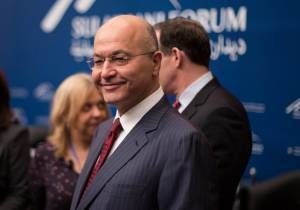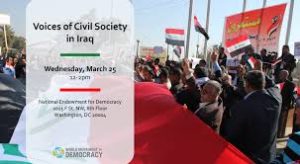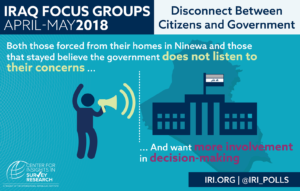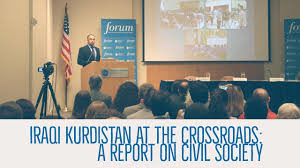
Barham Salih,Credit: The American University of Iraq Sulaimani
Iraqis need to consolidate their democracy and eliminate the deficiencies in its foundation and framework, argues Dr. Abbas Kadhim, Senior Fellow and Director of the Iraq Initiative at the Atlantic Council. After several elections and many years of political practice, the new political and bureaucratic framework has been tested and many of its salient shortcomings have been detected. Iraqi leaders must undertake the hard task of reform and make painful decisions to finalize the democratization process, he contends:
These reforms would include serious constitutional adjustments, key strategic legislation, strong accountability and transparency measures, and full reconciliation with the past to focus on securing a better future. In the coming years, Iraqi leaders must develop and implement solid strategies for the economy, energy, national security, population management, education and human development, foreign relations, infrastructure, the environment, socio-cultural advancement, and a host of other important tasks. To do that, they will need to adopt a robust policy of inclusive governance, extend participation to all Iraqis, and reach out to the international community for help in areas where Iraqi expertise is unavailable, or in short supply.
Barham Salih, the president of Iraq, greeted me this month in his family home in the city of Sulaymaniyah, about 40 miles from the Iranian border, writes Christian Caryl, Op-ed Editor/International for the Washington Post:
 The ensuing conversation was an extraordinary one — and to understand why, it helps to know something about Salih’s background. Born in 1960 to a prominent Kurdish family, he made his first acquaintance with Saddam Hussein’s jails at age 19. He spent many years abroad, earning a doctorate in statistics and computing at a British university, and later returned to Iraq, where he played a prominent role in Kurdish and Iraqi politics — including a stint as the Iraqi Kurds’ representative in Washington from 1992 to 2001. ….
The ensuing conversation was an extraordinary one — and to understand why, it helps to know something about Salih’s background. Born in 1960 to a prominent Kurdish family, he made his first acquaintance with Saddam Hussein’s jails at age 19. He spent many years abroad, earning a doctorate in statistics and computing at a British university, and later returned to Iraq, where he played a prominent role in Kurdish and Iraqi politics — including a stint as the Iraqi Kurds’ representative in Washington from 1992 to 2001. ….
“If you ask me, is the Iraqi government bureaucracy successful? Absolutely not,” he told me. “Is the Iraqi state succeeding? I think there are some prospects for this country to be moving in the right direction. But the legacies of the past, the problems are really, really monumental.” He spoke at length on the need to fight a deeply entrenched culture of corruption in the bureaucracy, the government’s failure to provide basic public services such as water and electricity, and the challenge of preventing an Islamic State revival, Caryl adds.
 The European Union Advisory Mission in Iraq (EUAM Iraq) this week launched a new Civil Society Strategy in line with Iraq’s National Security Strategy. A roundtable event in Baghdad was attended by representatives of various governments and NGO’s, including such democracy assistance groups as the International Republican Institute (IRI – left), the National Democratic Institute (NDI) and the International Institute for the Rule of Law (IIRL).
The European Union Advisory Mission in Iraq (EUAM Iraq) this week launched a new Civil Society Strategy in line with Iraq’s National Security Strategy. A roundtable event in Baghdad was attended by representatives of various governments and NGO’s, including such democracy assistance groups as the International Republican Institute (IRI – left), the National Democratic Institute (NDI) and the International Institute for the Rule of Law (IIRL).
But ‘counter-narratives’ are less likely to curb violent extremism, according to Eric Rosand, Nonresident Senior Fellow at Brookings’ Center for Middle East Policy, U.S. Relations with the Islamic World, and Emily Winterbotham, Senior Research Fellow at the Royal United Services Institute:
Among the reasons for the continued global popularity of counter-narrative initiatives—and the need to empower credible voices—is that it allows the focus to remain on the behavior and ideology of the violent extremists and not on the predatory and other counter-productive behavior of governments towards their citizens and the grievance-generating structural issues in a society. This helps explain why 74 countries in the global coalition have perhaps over focused on “countering Daesh’s propaganda” (Daesh is the Arabic acronym for ISIS)—in order “to oppose Daesh’s narrative and to undermine the appeal of its ideology… [and] to assist[and amplify] credible and authentic voices from the region.”
 Iraqi Kurds no longer feel they can fully count on American support to counter Iran, even inside Kurdistan, the Washington Institute‘s David Pollock observes (HT: FDD):
Iraqi Kurds no longer feel they can fully count on American support to counter Iran, even inside Kurdistan, the Washington Institute‘s David Pollock observes (HT: FDD):
A number cited the on-again, off-again U.S. military mission to the Kurds in neighboring Syria as an ominous portent. And several senior KRG officials told me they would welcome a continuing American military presence in Kurdistan, even or especially if the Iraqi parliament in Baghdad carried out current threats by pro-Iran factions to expel U.S. forces from Iraq.
With the retaking of the small Euphrates River village of Baghouz in Syria, decisions on what to do with the rapidly growing number of Islamic State detainees and their families need to be finalized. Many countries in the West are eager to avoid the issue altogether, the Soufan Center adds:
 Besides detainees, there are also tens of thousands of displaced persons who fled the fighting. Some of these individuals are most certainly Islamic State members, although determining who is who in such an environment is a nearly impossible task. Even with those difficulties, the U.S. and its European allies should not eschew responsibility for their citizens, especially considering the long-term security risks of doing so. There is also the difficult challenge of reconstruction and government reform in the ravaged territories of Iraq, which if left unresolved, will undoubtedly lay the groundwork for the Islamic State’s swift return to power in some of these areas.
Besides detainees, there are also tens of thousands of displaced persons who fled the fighting. Some of these individuals are most certainly Islamic State members, although determining who is who in such an environment is a nearly impossible task. Even with those difficulties, the U.S. and its European allies should not eschew responsibility for their citizens, especially considering the long-term security risks of doing so. There is also the difficult challenge of reconstruction and government reform in the ravaged territories of Iraq, which if left unresolved, will undoubtedly lay the groundwork for the Islamic State’s swift return to power in some of these areas.
“To date, there is no clear strategy for the U.S. to translate tactical battlefield success into something sustainable,” Soufan notes. “The Iraqi government is in desperate need of technical and legal assistance for its judiciary to help conduct transparent and fair trials for those being detained.”
And yet Salih [a former National Endowment for Democracy partner] is actually optimistic about the future of his country, the Post’s Caryl adds. “Life is coming back,” he said. “Every time I go out of the presidential palace in Baghdad — and I do try to go out as often as I can — I do see normalcy coming back, more and more. I do think there is a window of opportunity — it should be cherished. We’ve not had it like this for a long, long time. … It’s precious, but precarious.”







